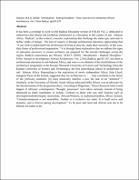| dc.description.abstract | It has been a privilege to work on the Radical Discipline section of FOLIO Vol. 2, dedicated to endeavours that inform and (re)define architecture as a discipline in the context of sub Saharan Africa. ‘Radical’, in this context, concerns explorations that challenge the status quo, and seek to define ‘paths of change’. The lens of enquiry is through architectural education, appreciating that ‘if you wish to understand why professions develop as they do, study their nurseries, in this case, their forms of professional preparation.’¹ It is through these explorations that we address the types of education necessary to ensure architects are prepared for the myriad challenges across the region. Radical explorations are Olweny, M.R.O. (2020). “Introduction - Radical Discipline.”
Folio: Journal of on temporary African Architecture, Vol. 2 Noir Radical, pp145-147. not alien to architectural education in sub-Saharan Africa, and were a core element of the establishment of the architecture programme at the Kwame Nkrumah University of Science and Technology (then the Kumasi University of Science and Technology), the first postcolonial school of architecture in
subSaharan Africa. Responding to the aspirations of newly independent Africa, John Lloyd, inaugural Dean of the School, suggested that, for architecture to ‘. . . truly contribute to the future of the [African] continent, [it] must drastically redefine a new the task of an “architect”’.² Similarly, at the University of Nairobi, South African-educated Selby Mvusi, was an advocate for
the decolonisation of the programme there. According to Magaziner, ‘Mvusi theorized what would happen if Africans’ contemporary “thoughtprocesses” were taken seriously instead of being dismissed as either inauthentic or archaic. Contrary to those who saw only binaries such as developed/underdeveloped, rural/urban, African/Western, or traditional/modern, Mvusi insisted, “Underdevelopment is not monolithic. Neither is it exclusive nor static. It is itself active and dynamic, and is forever pacing development.” To be poor and rural and African was not to be behind, but rather to be. | en_US |


